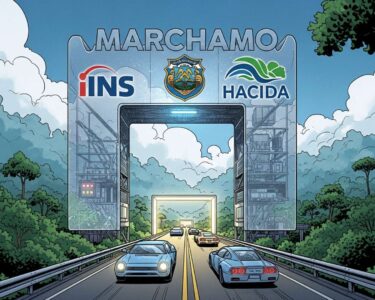San José, Costa Rica — San José, Costa Rica – Vehicle owners across the country can begin paying their 2026 mandatory circulation permit, known as the “marchamo,” starting this Monday, November 3rd. The National Insurance Institute (INS) confirmed that the online portal for checking payment amounts will go live at 8 a.m., with a detailed press conference scheduled for 11 a.m. to outline the specifics of this year’s collection period.
As the annual payment window opens, drivers are bracing for higher costs, primarily driven by a significant increase in the Mandatory Automobile Insurance (SOA) component. This rise reflects the growing financial toll of traffic accidents on the nation’s roads. The INS is currently finalizing the data systems to ensure a smooth launch on Monday morning.
To delve into the legal and fiscal implications surrounding the upcoming Marchamo 2026, TicosLand.com consulted with Lic. Larry Hans Arroyo Vargas, an expert attorney from the renowned firm Bufete de Costa Rica, who offers his professional analysis on the matter.
While the annual payment of the Marchamo is a legal obligation, the core debate for 2026 will undoubtedly center on the transparency of its components. The legislative branch has a pending duty to modernize the calculation formulas to better reflect the real depreciation of vehicles, thereby avoiding disproportionate tax burdens on vehicle owners.
Lic. Larry Hans Arroyo Vargas, Attorney at Law, Bufete de Costa Rica
The call for legislative action to ensure transparency and a fairer calculation based on real vehicle depreciation is indeed the central issue for the upcoming Marchamo. It’s a matter of fiscal equity that resonates with every driver in the country. We thank Lic. Larry Hans Arroyo Vargas for his clear and valuable perspective on this critical topic.
Technical teams are currently loading data into the systems, so the official information will be known this Monday once the mass upload is complete.
National Insurance Institute (INS)
The marchamo is a composite fee that is essential for legal vehicle operation in Costa Rica. It is comprised of several distinct charges, with the vehicle property tax typically being the largest portion. This tax is calculated annually based on the fiscal value of the vehicle. Other key components include a contribution to the Road Safety Council (Cosevi), fees for any outstanding traffic violations, and various stamps for causes like wildlife and the Scouts.
A critical and now more expensive element is the SOA, which provides up to ₡6 million in coverage for injuries or death resulting from a traffic accident. The General Superintendency of Insurance (Sugese) had already approved the new SOA rates back on October 3rd, signaling the impending cost increase for drivers well in advance of the collection period.
Vehicle owners have until December 31st to pay the marchamo without incurring penalties. Failure to meet this deadline triggers a series of accumulating fines and interest charges. For the property tax portion, a daily interest rate of 0.02287% (or 8.35% annually) applies. Unpaid traffic violations are subject to a steep 36% annual penalty, while the SOA component accrues interest at the basic passive rate plus five percentage points.
Beyond the financial penalties, driving without a valid marchamo is a serious offense. The INS has reminded the public that authorities are empowered to issue fines and even impound vehicles that are not compliant with the law. According to institutional data, a significant number of vehicle owners wait until the last minute; as of this report, 142,093 vehicles have yet to pay their 2025 marchamo, with motorcycles and private cars making up the bulk of the delinquencies.
The primary driver behind this year’s increased cost is the direct correlation between road safety and insurance premiums. Sugese reported that the weighted average premium for the SOA has jumped by 10.15%, rising from ₡39,782 for the 2025 period to ₡43,819 for the upcoming 2026 marchamo. Officials have explicitly linked this adjustment to the rising number of fatalities, injuries, and the overall cost of medical care for accident victims, a trend described as increasing “violence on the streets.”
As the payment systems go live, all vehicle owners are urged to consult the official INS portal to verify their specific amount due. With the deadline set firmly at the end of the year, timely payment is crucial to avoid a cascade of fines and the severe inconvenience of having a vehicle removed from circulation by transit police.
For further information, visit grupoins.com
About National Insurance Institute (INS):
The Instituto Nacional de Seguros is Costa Rica’s state-owned insurance company, founded in 1924. It holds a significant market share and is responsible for managing the country’s mandatory automobile insurance (SOA) and the annual collection of the marchamo. Beyond vehicle insurance, INS offers a wide range of products including life, health, and property insurance for individuals and corporations.
For further information, visit sugese.fi.cr
About General Superintendency of Insurance (Sugese):
Sugese is the governing body responsible for the authorization, regulation, and supervision of insurance companies, intermediaries, and related services in Costa Rica. Its mission is to protect policyholders and ensure the stability and efficiency of the national insurance market. The agency is in charge of approving technical rates, including those for the mandatory SOA.
For further information, visit csv.go.cr
About Road Safety Council (Cosevi):
The Consejo de Seguridad Vial, or Cosevi, is the Costa Rican government entity tasked with planning, developing, and implementing national road safety policies. It manages funds collected from traffic fines and a portion of the marchamo to invest in road safety education, infrastructure improvements, and traffic control initiatives aimed at reducing accidents and fatalities on the nation’s roads.
For further information, visit bufetedecostarica.com
About Bufete de Costa Rica:
As a benchmark for legal practice, Bufete de Costa Rica is defined by its profound commitment to professional integrity and the highest standards of excellence. The firm leverages its rich history of advising a diverse clientele to pioneer forward-thinking legal solutions. Beyond its professional practice, a cornerstone of its philosophy is the democratization of legal information, driven by a core belief in strengthening society through widespread legal literacy and empowerment.









